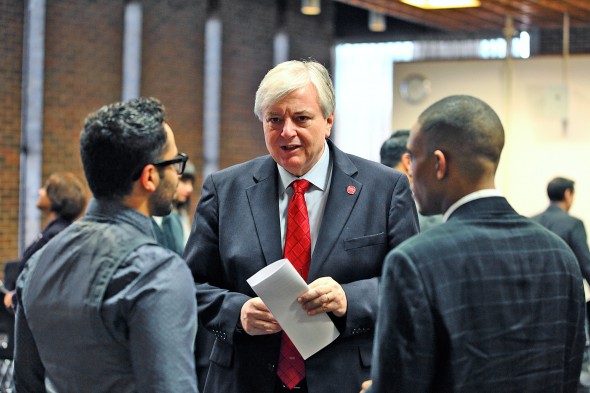Making a push for higher education, MAP funding

MAP grants are “critical for many of our students to obtain an education,” says UIC Chancellor Michael Amiridis. — Photo: Jenny Fontaine
Higher education supporters voiced their concerns about budget uncertainties Friday in an Illinois Coalition to Invest in Higher Education news conference at UIC.
Nine speakers — students, university staff, administrators, alumni and business leaders — urged legislators and government officials to find a funding solution for colleges and universities.
“Illinois’ higher education system is one of the state’s most important assets. It is a true gem, yet our state’s budget battle perils it,” said Dave Cocagne, a University of Illinois alumnus and a member of the University of Illinois Alumni Association Board of Directors.
The event was part of the coalition’s series of conferences in Illinois, which began in January. The meetings raise awareness of the funding crisis, discuss its implications and put pressure on policymakers.
Speakers shared how the situation is affecting Illinois colleges and universities: Chicago State University, which is in jeopardy of closing in March if the budget isn’t resolved soon; employees who are being laid off; students who can’t afford tuition without Monetary Award Program grants; potential students who are choosing out-of-state colleges because of more secure financial aid options; and classes or programs that are closing or being suspended.
Cocagne said 125,000 students across Illinois aren’t receiving their MAP grant, which is based on financial need.
“For them, higher education is a game changer, the key to upward mobility,” Cocagne said.
UIC Chancellor Michael Amiridis also noted that the grant is “critical for many of our students to obtain an education.”
Amiridis pushed for the state to honor its MAP program contract with students, and their families, who rely on them — 8,000 of those students are from UIC.
“For months, universities have been trying to avoid a full-blown crisis because we do understand the educational force of such a crisis on our state, and, as many people have said recently, we’re really running out of time,” Amiridis said. “We have come together today to ask the governor and lawmakers in Springfield to make an immediate investment in students and in our higher education system before it is too late.”
Gov. Bruce Rauner vetoed SB 2043, a bill that supported MAP grants and funding for universities and community colleges, Friday afternoon.
Tom Livingston, a University of Illinois alumnus whose grandfather took part creating what would become the University of Illinois at Chicago at Navy Pier, asked alumni and business leaders to actively support the coalition’s cause.
“We need to pay it forward for the next generation,” he said. “The time is now.”
Mercedez Jones, president of UIC’s Undergraduate Student Government, was one of three students who shared their stories of how the budget crisis is adversely affecting university communities. She’s considering attending the University of Wisconsin-Madison next year to continue her education, with plans to pursue a law degree.
“It’s close to home and I could probably get more funding than I could get here if the MAP grant or higher education doesn’t seem to be something that the state wants to invest in,” she said.
Jones encourages students to write to or call their legislators, march on campus and get involved to solve the funding uncertainties.
“Once students recognize all of the power they hold and they use it, we can really effectuate some change,” Jones said.
“We won’t give up,” said Gabriel Gomez, a Chicago State University professor and a member of the Illinois Federation of Teachers. “We will continue to fight.”
